Nate Fleming's Blog, page 36
August 28, 2014
A Comment on Kirk Cameron’s “Saving Christmas” Trailer
Yesterday, while playing working on the internet, I came upon the press release for Kirk Cameron’s upcoming film, Saving Christmas. This morning, thanks to a link on Cameron’s Facebook page, I was able to see the trailer.
I typically don’t comment on films based only on the trailer, but I felt compelled this morning to scribble down a few thoughts. And I hope that these thoughts are read through this lens: I like Kirk Cameron. I really do! I appreciate Cameron’s public stand for his faith in Hollywood. I enjoy watching his Way of the Master witnessing encounters. I did not like Fireproof very much, but I thought Cameron did a decent job in the lead role, and that he is definitely a camera-friendly actor.
But the trailer for Saving Christmas… oh, the trailer…
Patience, grasshopper. The link will come in time.
For the past few months, I’ve been watching films made for the faith-based audience with a critical eye, and while I’ve appreciated that many people of good faith lie behind these efforts, I’ve found myself largely disappointed with the finished products (you can see my reviews here, here, here, and here). I’ve come to the conclusion (and I’m not the only one – by any stretch of the imagination) that while we Christians are getting more proficient technically, we continue to spin our wheels as storytellers. We produce largely didactic films that are aimed squarely back at us – the Christian sub-culture of America.
Certainly there’s nothing wrong with making movies for ourselves, but there are two problems with what has been happening with Christian-marketed films over the past few years. First, the films we make for ourselves are as healthy for us as a steady diet of marshmallow peeps. Sure, a peep every now and then won’t kill you, but if that’s all you are eating, you will not be very healthy at all. Second, we’re not also making films that hit outside the sub-culture, thus doing ourselves a huge disservice and frankly – not being obedient to the evangelistic nature of the Gospel in the expression of our art.
And so, with that being said, here’s the trailer.
…
So, here’s the deal. Kirk Cameron is in a unique position. He is an outspoken Christian in Hollywood who can actually push film projects forward. He has his own production company (CAMFAM studios) that has partnered with Samuel Goldwyn to help get his films out to the public. He is – more or less – a household name.
And yet here he goes – down that same didactic trail – once again.
And I just don’t get it.
I don’t get why someone like Kirk Cameron doesn’t try to take his radical faith, and express it in a way that would not only build up the people inside the church bubble, but challenge them as well.
I don’t get why he doesn’t take his clout in the subculture and challenge believers to express their faith in more creative, less didactic ways.
I don’t get why Cameron won’t trust God to use the ambiguity of well-made art just as well as He can use the clarity of well-prepared preaching.
I don’t get why he won’t make a film that would interest someone outside the sub-culture.
It’s not a matter of courage. You can’t argue against the fact that Cameron is a brave man. He’s courageous enough to work the streets sharing his faith – even to some pretty rough folks…
He is principled enough to stand in the public square and say exactly what he believes to be true, even though it can be one of the most career-damaging things a celebrity can do these days…
He took a very public stand on purity, that in his films (and in life) he would not kiss any woman other than his wife, and – of course – he was mocked for taking such the stand…
And yet, here he is, with a film that predictably looks like just another salvo fired in the Christmas/culture wars. And it looks like it will come ready-packaged with all the things that make “faith-based” films so laughable to everyone – except to those in the sub-culture.
By watching the trailer, I sadly predict these things about Saving Christmas:
1. It will be on-the-nose message-heavy with a plot that will feel like it was tacked onto the message.
2. It will have awkward and predictable attempts at humor. For example, does the trailer really have a black guy at the end saying, “Can I get an amen!” while all the (mostly) white folk in the background awkwardly answer “Amen!”? Seriously?
3. There will be no ambiguity. It’s not going to raise any questions among the faithful – but it will just reinforce the sub-culture’s beliefs. Rub my back, and I’ll rub yours!
4. It will be a completely safe film for it’s faith-based audience, and the only challenge will be to go on ahead and celebrate Christmas the way you want to celebrate it, even in the face of what we American Christians laughably call “persecution”.
And here’s the rub with what will probably happen with this film: It will be seen by very few – if any – people outside of the Christian sub-culture.
Get that? Non-believers will not go see this film. Not because of Kirk Cameron (although for some, Cameron might be the one that keeps them away). The bigger issue is that they won’t go see this film because they don’t take our films seriously.
And isn’t that a shame? Christian-made films should be so well-made, so well-written, so well-acted, so thoughtful and haunting and beautiful and compelling – that people can’t stay away.
But so many of the extremely talented people who are working hard to make “faith-based” films are so bound up in making films to please the sub-culture, that I just can’t imagine how it will happen.
And that’s the pity of it.
Now back to play work.


There was a time… a look back only twenty years.
It’s hard to believe, but only twenty years ago…
There was a time when what you ate for dinner was only interesting to the people with whom you were eating. And you would never – ever – consider taking a picture of your meal.
There was a time when the only reason you watched a family’s photographs or home video was because you were invited to a friend’s home for a meal, and when they offered to show you pictures or video of their trip to Disney, you had no choice.
There was a time when the only way to explain to someone how you were feeling was by telling them, not by showing them a little cartoon face.
There was a time when nobody knew where you were. At any time. Ever.
There was a time when you found out where your old friend went on vacation because you ran into them at the store, and you asked what they’d been up to. Odds were that they didn’t have any pictures on hand to show you.
There was a time when a person went overseas – for business, for pleasure, for ministry – and you only found out what they did because you were in a position to ask. Otherwise, it was a big mystery that they kept to themselves.
There was a time when that person travelling overseas actually had to carry dozens of rolls of film to document their trip, and they were always worried that the airport X-ray machine would erase the pictures.
There was a time when you didn’t see an old friend for years, and then when you did, you had absolutely no idea what they’d been up to.
There was time when you could go to a movie without having heard every last exhausting detail about the making of the movie.
There was a time when the only reason you knew about the lifestyles of the rich and famous was because of a slightly pompous overweight British guy.
There was a time when you had to sit down with paper and a pen and actually hand-write a letter if you wanted to communicate to someone far away. Long distance calls were far too expensive.
There was a time when long-distance mattered when making a phone call.
There was a time when you had to get in a car and drive to a library if you needed to look up information or wanted a free book to read.
There was a time when you had to wait for a local record or video store to get a new release before you could listen or watch it.
There was a time when you had to watch MTV to see a music video.
There was a time when MTV actually played music videos.
There was a time when you had to visit the bank on Fridays or be stuck without any cash for the entire weekend.
There was a time when you didn’t find out news until well after it had happened, and you rarely found out what had happened in other countries.
There was a time when “tag” was a game on the playground, and not a social convention.
There was a time when video games were only available in a cartridge that you had to shove in a game system.
There was a time when a normal idiot with no media connections had no chance of getting anyone at all to care what he or she had to say about anything.
Especially about the way things used to be.
There was a time…
Feel free to add to the list!


August 25, 2014
Faith Based Films: Breaking The Bond
At the beginning of Calvary, Father James (Brendan Gleeson, best known as Alastar “Mad Eye” Moody in the Harry Potter films) is told in confession that he will be murdered in one week because of the sins of another priest.
I’m going to kill you, Father. I’m going to kill you ’cause you’ve done nothing wrong. I’m going to kill you because you’re innocent. Not right now, though. I’ll give you enough time to put your house in order. Make your peace with God. Sunday week, let’s say. I’ll meet you down by the beach, down by the water there. Killing a priest on a Sunday! That’ll be a good one.
 We don’t see who is making this threat, we only see the expressive face of the priest hearing the “confession”. The rest of the film follows Father James through his week as he deals with his regular parishioners’ troubles, as well as the threat against his own life. It is a week where Father James’ faith is buffeted from all sides, and we get the distinct feeling that it’s not an unusual week for the priest.
We don’t see who is making this threat, we only see the expressive face of the priest hearing the “confession”. The rest of the film follows Father James through his week as he deals with his regular parishioners’ troubles, as well as the threat against his own life. It is a week where Father James’ faith is buffeted from all sides, and we get the distinct feeling that it’s not an unusual week for the priest.
Calvary was made by English-born Irish filmmaker John Michael McDonagh, and although McDonagh makes no public profession of Christian faith, he has made a serious faith-based film. This is even more compelling when you find out that far from being a “faith-based filmmaker”, McDonagh sees himself as an anarchist, and he regards Calvary as an anti-institutional film. “Why listen to any institutions at all?” McDonagh asks rhetorically in one interview.
And yet, McDonagh’s film has the potential to resonate deeply with the faithful. Calvary is not afraid to wrestle with serious questions of the Christian faith, as seen through the prism of the life of this small-town parish priest, and the dysfunctional small town in which he  ministers. Among things, Father James is struggling to be an authentic follower of Christ while dealing with issues of abuse, racism, adultery, homosexuality, suicide, alcoholism, corruption, depression, and murder. These are tough issues that are difficult to examine one at a time, let alone all bunched together in one film, and yet there they are in Calvary.
ministers. Among things, Father James is struggling to be an authentic follower of Christ while dealing with issues of abuse, racism, adultery, homosexuality, suicide, alcoholism, corruption, depression, and murder. These are tough issues that are difficult to examine one at a time, let alone all bunched together in one film, and yet there they are in Calvary.
And why shouldn’t they be? These are issues that lurk under the surface of just about any church of any denomination at any given time. They are issues that make us squirm. They are issues that aren’t pleasant to behold. They are issues we don’t feel comfortable watching and hearing about and thinking about and dealing with.
But they are real life issues.
Of course, this raises the question in my mind: why aren’t American filmmakers of faith – the ones making Son of God, God’s Not Dead, Fireproof, Persecuted, Left Behind – dealing with these issues as openly, as plainly, as authentically, as this little sleeper film from Ireland made by the anarchist filmmaker?
In her article, 8 Things ‘Christian’ Filmmakers Can Learn From ‘Calvary‘, Patheos film critic and editor Rebecca Cusey makes a statement that believers need to hear loud and clear. All eight points are important, but I want to focus on her fifth point, “Faith Friendly and Family Friendly Are Not The Same Thing”, where Cusey writes:
If your main goal is to make a PG rated film with no boobs or f-bombs, you’ll miss great human stories, including many of the ones in the Bible. Make great kids’ movies for kids, but make great grown up movies for adults. “Calvary” is rated R for language, brief violence, and adult themes, but isn’t salacious or graphic.
When I first read Cusey’s words, having not seen Calvary, it was as though a light turned on in a quite dark room. The question immediately rose in my mind – when exactly did faith-based and family-friendly become synonymous?
 Think of all the so-called “faith-based” films that have been released in the past few years… can you think of any that were embraced by the church that were not also made for the whole family? Conversely, think of all the films that profoundly presented or illustrated Scriptural truths that were far from family-oriented films (The Shawshank Redemption, Unforgiven, Calvary, to name a few). None of these were made by filmmakers known for their faith.
Think of all the so-called “faith-based” films that have been released in the past few years… can you think of any that were embraced by the church that were not also made for the whole family? Conversely, think of all the films that profoundly presented or illustrated Scriptural truths that were far from family-oriented films (The Shawshank Redemption, Unforgiven, Calvary, to name a few). None of these were made by filmmakers known for their faith.
Suddenly it all becomes clear, doesn’t it?
Christian filmmakers have been locked into the single viewpoint that faith-based = family friendly, and it has made their job of developing solidly powerful Christian films extremely difficult. Being handcuffed to maintaining a PG rating takes away an enormous amount of material that Christians in filmmaking could potentially mine to tell more authentically human stories.
Think about the darkness and depravity of sinful humanity explored in the Bible – the disobedience of Adam and Eve, Cain’s murder of Abel, the wickedness of humanity in the time of Noah, Abraham lying to the Pharoah about Sarah being his wife, David sleeping with another man’s wife and then having the man killed to cover it up, and on and on and on and on and on. The Bible doesn’t shy away from showing the darkness of humanity, and yet for some reason, we do!
Now, let me back up for one moment and say that I get it. I really do. As a father of three children, I certainly appreciate a well-made family-appropriate film, and I also want my kids to watch films that build them up in their faith. I also realize that it isn’t pleasant or easy to portray darkness, and the last thing that an artist of faith wants to do is glorify darkness, and that ultimately, an artist of faith wants their art to point people to the light.
But what we seem to be missing is this: doesn’t light shine that much brighter in a dark room?
Please understand, I am not shouting, “All Christian films must be dark and disturbing!” In  fact, if anyone wants to produce my novel, Thimblerig’s Ark, it could definitely be a fantastic faith-based animated feature that would be great for the entire family. I’m certainly in favor of these sorts of films (especially if my name is in the credits).
fact, if anyone wants to produce my novel, Thimblerig’s Ark, it could definitely be a fantastic faith-based animated feature that would be great for the entire family. I’m certainly in favor of these sorts of films (especially if my name is in the credits).
What I am shouting is the thing that I keep returning to over and over in what has become a growing collection of essays on Christian filmmaking: that we – the ones paying to watch these films, the ones in the 21st century American Christian subculture – we, the church – must give our filmmakers our blessing to make the films they are called to make, even if it occasionally disrupts our sensibilities, makes us uncomfortable, and stretches our sensibilities.
We – the church – must support them in making films that we would never take our kids to see, but films that are important, films that matter, films that explore the desperate human condition and that impact and effect the society at large.
And we – the church – must break the impenetrable bond that has been built connecting family films and faith-based films – a bond that has frankly meant that we have trouble making either kind of film well.
Finally, we – the church – need to see the value of telling truthful films – films that are even painfully truthful – and we must release and support our artists to be able to tell them.
Then amazing things could potentially happen, and we might even be able to make better faith-based films than the non-faith-based anarchist British/Irish filmmakers.
Wouldn’t that be something?
—
Click here to read my original post, “What’s Wrong With Christian Filmmaking.”
My faith-based film reviews…


August 20, 2014
Don’t forget…
While we’re dumping ice over our heads for a good cause, don’t forget that ISIS continues to cut off people’s heads for an evil cause.


August 15, 2014
God’s Not Dead – Thimblerig’s Review – Part Two
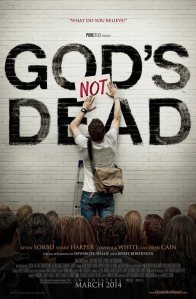 In part one of this review, I explained that God’s Not Dead has merit as a movie if you embrace the fact that it was made squarely for the Christian movie-going subculture. However, if you judge the film against other films being made for mainstream audiences, it comes up woefully short. I’d like to take this time to express what I liked about the movie, and where it failed me as a moviegoer.
In part one of this review, I explained that God’s Not Dead has merit as a movie if you embrace the fact that it was made squarely for the Christian movie-going subculture. However, if you judge the film against other films being made for mainstream audiences, it comes up woefully short. I’d like to take this time to express what I liked about the movie, and where it failed me as a moviegoer.
Warning: abundant spoilers ahead.
What I liked about God’s Not Dead.
1. I appreciated the way the film attempted to take separate stories and bring them together. This is a film style that can be very effective (thinking of Babel, Traffic, even Pulp Fiction – all films that did this well), and I don’t recall any Christian-made films attempting it before, and so it was a bit of a risk. I’m not sure that it succeeded in the execution, but kudos to the filmmakers for trying to do something a bit different in a faith-based film.
2. The cinematography. In my former two reviews, I complimented the cinematography, and this film was also nicely shot. It seems like one thing our tribe is starting to do well as filmmakers is to hire people who know what a film needs to look like to be taken seriously. It was a well-shot film.
 3. The casting of in the role of Joshua Wheaton. Shane was a good choice, and he did a good job. In fact, one of the things I didn’t like about the multiple storyline idea was that it took away from Joshua’s story, and that was the story I wanted to see more of. I do think there was much more that could have been done with the character (more on this later), but the actor was earnest in his portrayal and he was very likable.
3. The casting of in the role of Joshua Wheaton. Shane was a good choice, and he did a good job. In fact, one of the things I didn’t like about the multiple storyline idea was that it took away from Joshua’s story, and that was the story I wanted to see more of. I do think there was much more that could have been done with the character (more on this later), but the actor was earnest in his portrayal and he was very likable.
4. As a Christian, the film inspired me to not be afraid to stand up for my faith. For that reason, I’ll probably show it to my children to encourage them as they learn and grow. My guess is that this was a big motivation to the filmmakers for the creation of this film. In that way, they succeeded.
5. The filmmakers didn’t tie up all the loose ends. It is certainly to their credit that they avoided the temptation of having Amy miraculously cured of cancer, Dean Cain’s character repent and have a change of heart, and/or Ayisha’s father seeing a vision of Jesus and taking her back home.
What I didn’t like about God’s Not Dead.
1. The Christian celebrity cameos designed to appeal to evangelical audiences.
This was my biggest beef with the film.
Coming from southwest Virginia, I understand completely that Duck Dynasty is a cultural force. But seeing the Robertsons on the screen in this film just further reinforced to me that this film had been made solely for the entertainment and edification of the Christian audience.
Let’s say for a moment that Willie is the face of Christianity in America these days. Just how exactly did his inclusion help propel the storyline forward? It was an incredibly preachy, on-the-nose scene – from the obviously antagonistic questions asked by Amy to the junior sermon answers given by the Robertsons – it was just completely unnecessary except as a chance for the Robertsons to preach.
And this movie was already more preachy than it should have been, even without the Duck Dynasty scene.
(As a side note, if Amy really wanted to cause a stink then she should have asked Willie Robertson to explain the church of Christ theology on the role of baptism in salvation. That would have made lots of Lifeway bookstore owners a bit more nervous about carrying Duck Dynasty products in their stores! If you don’t know what I mean, just Google it.)
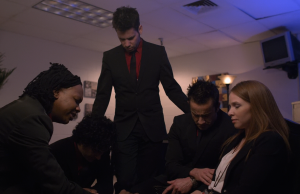 Another example of Christian celebrity overkill was the Newsboys. I like their music, but I found that having a huge Christian band included so intimately in the plot at the end – when they hadn’t been involved up until that point – immediately brought me out of the film. After all, how many people actually get to have private one-on-one prayer times with Michael Tate and the boys? I know it happens (see my story of meeting Rich Mullins), but in God’s Not Dead, it just seemed forced. Like the filmmakers wanted be able to say, “Hey! We got the Newsboys! Come watch our movie!”
Another example of Christian celebrity overkill was the Newsboys. I like their music, but I found that having a huge Christian band included so intimately in the plot at the end – when they hadn’t been involved up until that point – immediately brought me out of the film. After all, how many people actually get to have private one-on-one prayer times with Michael Tate and the boys? I know it happens (see my story of meeting Rich Mullins), but in God’s Not Dead, it just seemed forced. Like the filmmakers wanted be able to say, “Hey! We got the Newsboys! Come watch our movie!”
Why didn’t they take Amy’s prayer in a more natural direction? It would been truer to the storyline to have Amy hear about Josh’s ongoing battle with Dr. Radisson and decide to interview him. Then, as she did with the Newsboys, she could let it slip about her cancer, and he could have been the one to pray with her. If they had done this, the stories would have been more closely interweaving, and someone we actually cared about could have been the one to do this pivotal action of praying with the dying journalist.
2. The generalized characterizations.
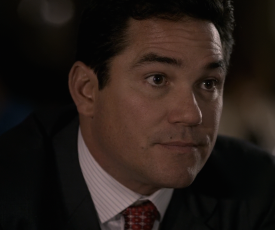 The generalized characterizations were disappointingly predictable for a faith-based film, and seemed designed for easy digestion by a pre-ordered faith-based audience.
The generalized characterizations were disappointingly predictable for a faith-based film, and seemed designed for easy digestion by a pre-ordered faith-based audience.
Why, in Christian movies, do we so often have Christians portrayed as all good, wonderful people while the non-Christians are all narrow-minded moustache-twisters?
In God’s Not Dead, the exception to this was Josh’s weird and ultimately unlikable Christian girlfriend who breaks up with him for standing up for his faith. This was the most unpredictable thing that happened in the film, but it didn’t make sense based on what we saw of their relationship.
Here’s the thing about being unpredictable in storytelling – it must make sense in the context of the story! The way she suddenly began treating him and the subsequent breakup was out of character from what we saw at the beginning of the film, when things seemed perfect for the young couple.
Back to the portrayal of Christians versus non-Christians…. Haven’t we all known despicable Christians? Heck, I can be the most despicable! And haven’t we all known kind and loving non-Christians? And yet with God’s Not Dead, they were just a step away from dressing the non-Christians in black and the Christians in white to further drive home the point that Christians = good, non-Christians = bad. This was an unfortunate and easy choice in the writing.
3. The weak writing with regards to Professor Radisson’s character development and arc in the story
This is the part that bummed me out the most, because I really like Kevin Sorbo, and respect the position he takes in public regarding his faith. I really, I really wanted to like his performance in this film.
And I did like him.
For a while.
I completely bought the character during the first and second classroom scenes, and felt like Professor Radisson was an interesting and real person who was simply antagonistic towards theists.
And then we had the ridiculous hallway scene after Joshua’s second presentation where Radisson confronts Joshua and threatens to make it his personal mission to destroy Joshua’s future if he continues to present his arguments. I felt like he was going to point a clutching hand at Joshua and as the kid starts choking say, “I find your abundance of faith disturbing!”
 This was when the professor slipped from being an interesting character to being a not-so-interesting caricature.
This was when the professor slipped from being an interesting character to being a not-so-interesting caricature.
And then there was the confession he made to Josh, about his mother dying of cancer. I didn’t buy that he would admit that to his adversary. And I also didn’t buy that the character from the first part of the film would ever admit that he hates God, because he denied God’s existence altogether! And to admit it to the kid who is showing him up in class? And to admit it in front of the class? I might have bought it if he’d admitted the fact to his girlfriend, but not Josh. That just didn’t make sense.
And speaking of the girlfriend…
Why did the professor spend so much time humiliating his beautiful girlfriend in front of his colleagues? Why would he bother dating an outspoken Christian in the first place? The dialogue seemed to suggest that they started dating when she was a student in his classroom, but why would she – as an outspoken Christian – date the professor who was reputed to be rabidly anti-Christian? Because of the multiple story lines, we never got to know or really even care about these two.
This was my complaint about the execution of the multiple storyline technique – while I admired the attempt, we didn’t learn enough about the supporting characters to care much about their situation. The exception to this for me was the story of the Muslim girl who had secretly converted to Christianity. I bought her storyline, and felt like it was well-executed and acted by both daughter and father.
But back to the professor’s relationship with his girlfriend… this was especially important, because it is apparently Radisson’s realized care for the girl that drives him to make that fatal run to the concert hall (and why didn’t he drive?). As it is, Radisson’s character arc seemed forced and contrived, all to get him to the intersection at that time.
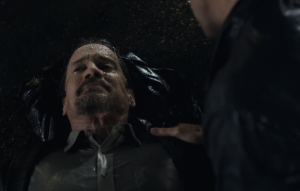 Finally, I was completely dissatisfied with the predictable fate of Professor Radission. The characters arc seemed so – again – forced and contrived, all to get him to the intersection at the right time to be hit and saved. I know that he was apparently in the middle of having a change of heart, but if all it took to push him back into faith was a little car accident, couldn’t Josh have just run the professor over ten minutes into the film and we’d have had a much shorter film?
Finally, I was completely dissatisfied with the predictable fate of Professor Radission. The characters arc seemed so – again – forced and contrived, all to get him to the intersection at the right time to be hit and saved. I know that he was apparently in the middle of having a change of heart, but if all it took to push him back into faith was a little car accident, couldn’t Josh have just run the professor over ten minutes into the film and we’d have had a much shorter film?
—
In conclusion, while God’s Not Dead did some things right, it still didn’t achieve what a Christian film should – in my opinion – be able to achieve. I still hold strong to my argument that the reason we keep coming back to this – film after film – is because of the handcuffs and lack of artistic freedom the American church gives to her artists to make a better product. If an extremely well-made film doesn’t check all the right boxes, we won’t support it. If a film checks all the right boxes but suffers in the writing or directing, rendering it a film that most non-Christians would never see, we’ll support it.
Church, when will we stop doing this? When will we release our artists to do what they are trained to do? God’s Not Dead was a decent made-for-Christians movie, but it could have been a fantastic made-for-everyone movie. The ideas and motivation behind the film were laudable, but the finished product – being so handcuffed by oversensitivity to the Christian consumer – was far less than it could have been, and that’s a pity.
Christian artists – I know you have to be able to fund your films, and the evangelical American church-going dollar is mighty attractive, but just know that there are lots of us out here rooting for you, and looking forward to the day when you have the freedom to make such amazing, well-written, professionally produced films that we will proudly show them to our non-Christian friends.
And please cut out the Christian celebrity cameos when you make the films. Isn’t the idea of Christian celebrity counter to the whole idea of the Christian faith anyway?
Yes, Christian superstars, I’m looking at you.
But that’s the subject of another blog post. For now…
God’s Not Dead – 2.5/5 Golden Groundhogs


August 13, 2014
God’s Not Dead – Thimblerig’s Review – Part One
 God’s Not Dead… the movie that started it all for me.
God’s Not Dead… the movie that started it all for me.
Earlier this year, God’s Not Dead opened wide across America, and made a lot more money than anyone thought it could. This got the attention of lots of folks, including me.
I was in China, and so was unable to see the film. I read a review, and that review lead me to write “What’s Wrong With Christian Filmmaking”, a blog post that has been read over 100,000 times as people have apparently been asking the same question.
Tonight, I was finally able to watch the movie, and I’m extremely bummed to say that things are worse than I thought.
This is the film that American Christendom embraced, buying out countless theaters, taking endless youth groups, and ultimately helping earn the film over $60,000,000?
This is the film that The Dove Foundation calls a “powerful film“, holding it up as a high expression of Christian filmmaking, and awarding it a “faith friendly” seal?
I’m sorry, folks, but if this is the best we can do, then we are in big, big trouble.
On the one hand, I feel bad saying this because I know that the film was made by well-intentioned people of faith, and many of them are highly trained professionals working in the trenches of the entertainment industry, doing the best they can to make a film that will impact the world. I respect that. I really do.
I also feel bad saying this because many of my friends who I love and respect as Christian brothers and sisters absolutely loved the film, and I recognize that opinions are like belly buttons. I don’t think I’m more correct than they are, nor am I coming close to suggesting that they need to change their opinion of the film.
But this film is such a keen example to me of the problem we have in 21st century creative Christianity and the things that we permit to be produced in our name, that I can’t NOT speak my mind.
 I need to pause here, and step back for a moment. A few weeks ago, I was finally able to watch Aronofsky’s Noah . I still haven’t written my review for Noah, but one of the huge things that I walked away from with that film was that Noah was not made for the church. It was a film made by a critically acclaimed atheist filmmaker – and he made it for himself, and for those people who adore him.
I need to pause here, and step back for a moment. A few weeks ago, I was finally able to watch Aronofsky’s Noah . I still haven’t written my review for Noah, but one of the huge things that I walked away from with that film was that Noah was not made for the church. It was a film made by a critically acclaimed atheist filmmaker – and he made it for himself, and for those people who adore him.
Do you hear that church? Many of you got all upset over a film that really wasn’t meant for you anyway. This was a film made for the filmmaker and his ilk. It was an auteur expression on a blockbuster budget scale.
And this is why you didn’t like the movie.
I don’t blame those of you who were vocal of your distaste for the movie, because you were purposefully misled by lots and lots of people into going to see this film. The studio lied to you, trying to tell you it was just an interesting take on a biblical tale, and that if you don’t give it a chance, you’re close-minded and not savvy enough. Lots of Christian leaders who had advanced screenings misled you (purposefully? I don’t know. I’m not going to accuse anyone of being purposefully misleading), trying to convince you that it was made for you and working up resource materials for pastors, making the claim that the film would be a great way to engage the culture.
They were right in this one thing, that the film was potentially a launching point for engaging the culture, but they were wrong to encourage you that the film was for you. Because it wasn’t at all for you. Not even close.
And here’s the crazy thing – if you approach Noah with the understanding that it wasn’t made for Christians – you can find quite a bit to enjoy and appreciate about the film. This, in such the same way you might from other secular films also not made for you – such as Shawshank Redemption, Unforgiven, or Chariots of Fire.
Which brings me back to God’s Not Dead.
Christians, this is a movie that was made for you. It had the right language so that you would easily understand it, it had a conflict that would fire you up to just the right level, it had celebrity cameos that you would love, it had a resolution that might have made you weep with joy and relief, and it concluded with a challenge that – if you did it – would make you think you were actually doing something meaningful.
God’s Not Dead is a classic example of a movie that was made to preach to the choir, and my criticisms of the film will revolve around that point.
Just like I didn’t mind watching Noah when I realized who it was made for, I found that I could enjoy aspects of God’s Not Dead when I realized who it was made for. I’ll gladly show the film to my family, and we’ll talk about the merits of the film as well as the things that could have been done better. However, I was also glad to know that I would be very strategic in choosing to show the film to a non-Christian friend because ultimately, it was a film that was not made for them.
I look forward to the day when we Christians give our filmmakers the resources and support that they need to consistently make films that we can be excited to watch with our non-Christian films.
Whew! That was a heckuva a long intro to my actual review. I’ll be posting my specific thoughts about the movie in part 2, later today.


August 11, 2014
In Memory of Robin Williams

O Captain, my Captain
O Captain! My Captain!
BY WALT WHITMAN
O Captain! my Captain! our fearful trip is done,
The ship has weather’d every rack, the prize we sought is won,
The port is near, the bells I hear, the people all exulting,
While follow eyes the steady keel, the vessel grim and daring;
But O heart! heart! heart!
O the bleeding drops of red,
Where on the deck my Captain lies,
Fallen cold and dead.
O Captain! my Captain! rise up and hear the bells;
Rise up—for you the flag is flung—for you the bugle trills,
For you bouquets and ribbon’d wreaths—for you the shores a-crowding,
For you they call, the swaying mass, their eager faces turning;
Here Captain! dear father!
The arm beneath your head!
It is some dream that on the deck,
You’ve fallen cold and dead.
My Captain does not answer, his lips are pale and still,
My father does not feel my arm, he has no pulse nor will,
The ship is anchor’d safe and sound, its voyage closed and done,
From fearful trip the victor ship comes in with object won;
Exult O shores, and ring O bells!
But I with mournful tread,
Walk the deck my Captain lies,
Fallen cold and dead.


August 10, 2014
An Open Letter to Ann Coulter Regarding that “Idiotic” Ebola Doc
Dear Ms. Coulter,
This afternoon I read your August 6, 2014 online column, in which you wrote an article entitled, “Ebola Doc’s Condition Downgraded to Idiotic“. In this article, you questioned the life choices of Dr. Kent Brantly, the doctor who went to Africa with his family last year to serve a two-year fellowship through Samaratin’s Purse, and by extension, you questioned the life choices of anyone who has made a similar choice. In this letter, I will respond to some of the things you said in that article, and give you some suggestions for future articles.
Ms. Coulter, you started your article by citing the enormous amount of money (nearly 2 million) spent to bring Dr. Brantly and humanitarian aid worker Nancy Writebol home, saying that any good that he may have done was overwhelmed by Samaratin’s Purse’s decision to spend such an amount on two people.
In principal, I would agree with you. Samaratin’s Purse raises support for those individuals they send out, and so they have a responsibility to the ones who give – to use that money wisely. As I thought about this, I started to wonder if perhaps you donate to Samaratin’s Purse, and so your disagreement with the way the money was spent was somewhat personal? If so, you should take some solace in the knowledge that the organization requires that all people who serve with them have evacuation insurance. This means that there is a pretty good chance that the tab for evacuating the two two Samaratin’s Purse workers would have been at least partially picked up by insurance.
But at the end of the day, if you disagree with the way any charitable organization uses the funds they raise, you are free to choose another charity or non-profit. In just a moment I’ll have some suggestions for you about some organizations that might better suit your desires to “care for your own first”.
Next, you lamented that Dr. Brantly chose to go serve the people of Ebola-ridden West Africa rather than staying in his own godless homeland and practicing medicine somewhere like Los Angeles, where he may have been able to share his faith with a successful Hollywood producer, thereby potentially influencing the greater culture by influencing a culture maker.
This is where you started to lose me, Ann (do you mind if I call you Ann?). Not because I don’t think Christians should be in Hollywood, but because there are already so many Christians in Hollywood right now, toiling (like their brothers and sisters overseas) in near anonymity. Reading your article in which you put so much emphasis on Dr. Brantley’s potential influence a Hollywood power broker, I wondered why you spend your time tearing down the work of Dr. Brantly rather than building up the ones doing the very thing you wish the Ebola doctor would do?
And as a Christian who has spent a bit of time in Hollywood attempting this, allow me to speak for the others saying that I don’t see Dr. Brantly’s story as a competition or a distraction. In fact, there’s a pretty good chance some up-and-coming Christian screenwriter may pick up his or her laptop and start coming up with a rough draft of the Ebola Doc’s story, and go on to make a fantastic biopic! Wouldn’t that be amazing?
You see, Ann, here’s the thing about the many L.A.-based Christians you ignored in your article – many of them are not just trying to engage the ones who are influencing the culture, but they are actually trying to influence the culture themselves! And they need our help and support as much as those who would go overseas!
ARTICLE SUGGESTION #1
If seeing the Gospel of Jesus Christ spread in Hollywood is truly your goal, let me challenge you to research and write about those who are trying to accomplish that very task. And since I know you’re a busy lady, let me help you get started. Here are just a few of the excellent organizations equipping Christians to survive and succeed in Hollywood:
Act One: Writing for Hollywood
Christian Film and Television Commission
And you can find lots more here.
Unfortunately, Ann, I found that your article just went disappointedly downhill from your Hollywood reference. I would like to respectfully request that you reconsider a couple of very important points.
You concluded mistakenly that Christians go overseas to escape the culture wars – to avoid being called “homophobes, racists, sexists and bigots.” There are a couple of problems with this. First, Christians have been leaving their homelands to share the fantastic news of Jesus Christ since Paul and Barnabus went on their first missionary journey in Acts 13. That’s nearly 2,000 years of Christian missionary history, and while some through the years may have gone to escape an uncomfortable home situation, most were heading to much more difficult conditions and would perhaps have preferred facing the relatively harmless issue of being called names to what they had to endure as they lived as foreigners in unfamiliar cultures.
In fact, this gives me another idea for a future article for you! Isn’t this fun?
ARTICLE SUGGESTION #2
Rather than spending time accusing folks like Dr. Brantly of going to difficult spots to avoid being called names, why don’t you help bring attention to some of the Christians who are undergoing actual physical persecution and death for their faith, and some Christians who choose to leave the comfort of home to help them? That would make for a fantastic article!
For example, you may have heard a little story in the news recently about Christians in Iraq being systematically exterminated by Islamist thugs? Looking through the archives of your blog, I notice that you haven’t written about them (the Christians – not the thugs), and so that would make a great start on a worthwhile article for your website.
Again, to help with your research, here are a few links:
A story about Christian children being beheaded by ISIS
A personal account from a Christian in Mosul
Iraq’s Largest Christian Town Falls
There are many more stories about the atrocities being committed in Iraq, but I expect you have a staff who can help you find them, so I won’t do it here. I don’t want to take bread out of someone else’s mouth.
But this does bring me to the conclusion of your article, Ann. This is where you claim that Dr. Brantly (and again – others who make the same kind of life choice he made) have some good old fashioned delusions of grandeur. You wrote:
“But serving the needy in some deadbeat town in Texas wouldn’t have been “heroic.” We wouldn’t hear all the superlatives about Dr. Brantly’s “unusual drive to help the less fortunate” or his membership in the “Gold Humanism Honor Society.” Leaving his family behind in Texas to help the poor 6,000 miles away — that’s the ticket.”
This is the point where I think you may have skipped a regiment of medication, or had too much red bull, or spent too much time in the sun. Let me tell you, Ann, international mission work is the last enterprise one goes into for the purposes of being perceived as heroic.
Given, we Christians have our missionary heroes who inspire us to be more faithful and to step out and take risks – heroes who have paid the ultimate price to go to places like ebola-infested Liberia, or the dangerous jungles of Ecuador, or even the wild woods of New Jersey – but the vast majority of missionaries do not leave the comforts of home because they have dreams of having statues of their martyred selves erected on various seminary campuses.
The dirty little secret is that most missionaries go overseas knowing that they will be serving in virtual anonymity, that they will spend an inordinate amount of time struggling to understand a culture and a language that is not their own, that they are choosing to watch from afar as family members back home are born, others marry, and still others die – while they are absent. And they do it because it is their calling.
Ann, this concept of a calling may be hard for someone outside the church to comprehend, but since you write so passionately about America’s desperate need for God, I think you must understand. But for the sake of those others, I’ll just say that Christians believe that God is at work in the world (not just in America – I know, hard to imagine what with Manifest Destiny and all), and He calls His people to certain times and places to do His work. This includes the doctors who practice with Hollywood bigwigs in Los Angeles as well as those who go to “disease-riddled cesspools” to help people who are unable to find help anywhere else.
Apparently, this calling is a part of the story of Dr. Kent Brantly, as it is with so many others who leave the comforts of home to be the hands and feet of Christ in distant (or near) lands. You can read a very telling testimonial to Dr. Brantly’s life here, written by one of his university professors, where you can find out just what motivated him to go practice medicine in Africa.
Which leads me to a final suggestion for a future article for you.
ARTICLE SUGGESTION #3
I know it’s not your style, but I would finally recommend that you consider writing an article where you take back most of the things you said in your August 6th article, and possibly even – shudder – apologize.
I know, I know, but just let me share my final interesting fact about overseas missionaries, especially Americans. Many are extremely interested in the politics of their home country, and many are politically conservative. Twenty years ago, they were not able to keep track of what was going on back home, but thanks to the internet, they are more able than ever before to pay attention to what’s going on back home.
By attacking the life choice to which these people have been called you are cutting yourself off from a segment of the population who would ordinarily agree your stance on political issues. Not only are you cutting yourself off from the missionaries, but also from those folks who don’t feel called overseas but feel passionately supportive of those that do.
I’m not suggesting a boycott or anything, but I want you to see that with that one simple misinformed article, you made lots of conservative Christian folks realize that our more liberal friends may have been correct in their dislike of your opinions. After all, if you got this one so horribly wrong, what else are you wrong about?
Just a thought, Ann. Just a thought.
Thanks for taking the time to read this letter, and I’ll look forward to reading some of those articles on some future page of http://www.anncoulter.com!
Sincerely,
Nate Fleming


August 5, 2014
Heaven is for Real – Thimblerig’s Review
Several months ago, I wrote a blog article that got some traction, entitled “What’s Wrong with Christian Filmmaking”. In that article, I listed five things that I thought the church needs to do to give our filmmakers the freedom to make movies that can actually make a dent in the greater culture – which Christian-made films typically fail to do, for a multitude of reasons.
I’m in a bit of a conundrum about Heaven is for Real, the “faith-based” film I watched tonight. Going into it, I didn’t know much about the story, except that it was based on the best-selling book by the same name. My assumption was that this was another film produced by Christians for Christians, and that it would fit my five points perfectly. But research has shown that I was wrong.
Yes, there were Christians involved in the making of the film – megapastor T.D. Jakes is one of the producers, and screenwriter and director Randall Wallace (screenwriter for Braveheart, director for Secretariat) has spoken openly about his Christian faith in interviews – but the film was not made by faith-based production companies (unlike Son of God and God’s not Dead), and so it sort of balances on the edge of the point of my article.
Still, I think it’s valuable to take the time to look at the film, and to see how it did on my five points – and to see what we Christians can learn from this Christian film that was not wholly made by Christians.
The Synopsis
As the opening credits roll, we see that that Heaven is for Real is based on a true story that happened to the Burpo family of Imperial, Nebraska in the early 2000’s. Todd Burpo (nicely played by Greg Kinnear) is a typical midwestern everyman who installs and repairs garage doors, coaches the high school wrestling team, volunteers with the local fire department, and pastors a small church. Todd and his wife Sonja (British actress Kelly Reilly) are in a loving relationship and have two young children, Cassie and Connor.
Over the course of the first act, we learn that the Burpo family has a pretty good life, filled with supportive friends in a quintessential small-town atmosphere (including a nicely understated performance by Thomas Haden Church). The family has ups and downs (broken bones, kidney stones, financial difficulties), but these challenges serve to bring the family closer together rather than pulling them apart.
The movie switches gears when, after a family getaway to Denver, four year old Connor falls ill. Todd and Sonja try to treat him at home until it becomes obvious that the illness is more serious than they thought, and so they rush him to the hospital. When they arrive, the doctors discover that he has had a burst appendix, and take him to the OR for emergency surgery. As the boy’s life hangs in the balance, Sonja gets on her cell phone and starts calling her friends for prayer, and Todd goes to the hospital chapel to pray, where he explodes at God for possibly taking away his son.
 The boy recovers, and then Todd discovers that his son didn’t just sleep through his surgery, but apparently went on a little trip to heaven. Over the course of the film, Connor tells Todd what he and Sonja were doing while he was being treated, describes seeing and hearing angels sing, recounts spending time with Jesus (and Jesus’s horse), and relates meeting with various family members that he couldn’t have known.
The boy recovers, and then Todd discovers that his son didn’t just sleep through his surgery, but apparently went on a little trip to heaven. Over the course of the film, Connor tells Todd what he and Sonja were doing while he was being treated, describes seeing and hearing angels sing, recounts spending time with Jesus (and Jesus’s horse), and relates meeting with various family members that he couldn’t have known.
This revelation shakes Todd to the core as he struggles to understand what his son has experienced and he is confronted with the actual reality of the heaven about which he has spent his life preaching.
Because of Todd’s openness about Connor’s experience, he is mocked by townsfolk, nearly loses his position at the church, and finds a wedge driven into his relationship with his wife.
What I liked about the film.
1. It was extremely well acted. Greg Kinnear, specifically, does a fantastic job leading us down the road of Todd Burpo’s crisis of faith. Kelly Reilly did a great job (loved her in Flight). Thomas Haden Church was underused, but is a joy to watch.
[A note to all the wealthy Christians who read this blog - this is the caliber of actor we should be helping our directors afford! Actors don't have to actually be Christian actors to effectively play Christian roles. In fact, if they are professionals, they will enjoy the challenge of playing well-written characters of any background, and the Christians on the shoot might actually be able to share their faith in the process. So start writing those checks!]
2. The movie had one of the most realistic and complementary portrayals of a Christian couple of any movie I’ve seen. This is a pastor and his wife who are quite often hot for each other, and they aren’t afraid of showing affection. This is a couple that also loses patience and argue when they are upset with each other, demonstrating that yes, pastors and pastor’s wives are people, too.
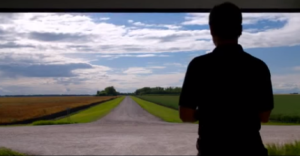 3. The film was technically as good as any film out there. I was a bit concerned at first that the film would look like a made-for-tv film, but the cinematographer quickly took away that fear. It was a beautifully shot film.
3. The film was technically as good as any film out there. I was a bit concerned at first that the film would look like a made-for-tv film, but the cinematographer quickly took away that fear. It was a beautifully shot film.
Now, to the five points of my original article, the five things the Body of Christ can do to help filmmakers who are Christians make better films.
1. Allow the artist to take risks
Heaven is for Real is an extremely safe story based on an extremely safe novel. Ironically, this movie failed to take a very specific risk – and this is where the secular producer’s influence was so keenly felt – by not having a more clear Gospel presentation. This is ironic to me because I certainly don’t advocate that a Gospel presentation is absolutely necessary for a film made by Christians. In fact, the problem with most faith-based films is that they often shoehorn the Gospel into the storyline, and the end result feels forced. Heaven is for Real is a film that could have used a bit more clarity in the subject of heaven and how one gets there, and it could have been seamlessly added considering the subject matter. For heaven’s sake, the climax of the movie was a sermon preached to a packed church about heaven where the name of Jesus is mentioned, and Todd doesn’t even explain the Christian understanding of how one gets there!
But I don’t blame Todd Burpo for this. I blame T.D. Jakes. If I were pastor/producer T.D. Jakes, I would have insisted on it. Certainly, the film is not a Billy Graham Crusade production, but making a film about heaven where the unchurched audience isn’t even told how to get there is irresponsible.
One last thing about presenting the Gospel in film. This isn’t something that has to be heavy-handed and shoehorned and forced, like we Christians so often do in the films we make. One of my favorite examples of this being done successfully is in the 1997 film, Amistad, directed by Steven Spielberg.
2. Challenge the audience

Image of Jesus from the film, supposedly painted by a young Lithuanian girl who had visions of Jesus.
Heaven is for Real succeeded at this, for the most part. If you consider the faith-based audience, I believe they were challenged as they were presented with the story of a child who claimed to have seen heaven. The film (and the book before it ) generated a healthy amount of controversy among Christians (as have several of the other books that tell stories of people seeing heaven), since many Christians believe that God has given us all the revelation we need in the 66 books of the Bible (73 for Catholics), and that we aren’t to add to what we’ve been given. Others believe that God still speaks, and can and will give such revelations as He sees fit, and they may have been challenged by the realistic portrayal of a pastor who didn’t accept the revelations blindly.
The non-Christian audience was perhaps challenged as they were given a pretty clear picture of heaven presented by a four-year-old boy who couldn’t have known the things he claimed to know. While most non-Christians might enjoy the film as a modern fairy tale, some may have been challenged and intrigued by the picture of heaven which Connor paints.
But I still would have liked that audience to have been challenged more clearly with a clear Gospel message.
3. Art is art and the pulpit is the pulpit, and while they might cross paths from time to time, they are different animals
This was one of those rare moments where the two did cross paths, and it was done well. I believe this worked because Randall Wallace and Greg Kinnear gave us such a well-rounded picture of a tent-making pastor that we accepted his place in the pulpit as a natural place.
4. Ask questions, but don’t feel like you need to provide all the answers
In the case of Heaven is for Real, the question was – did Connor really experience this visit to heaven? Thankfully, the filmmakers never try to answer the question definitively. The bigger question is connected to Todd Burpo and his own struggles with the his faith and his understanding of Connor’s vision. Yes, the movie had a resolution, but it was not as tidy as it could have been. We’re left still wondering what exactly happened to the boy, but we’re also left with the confidence that the Burpo family is going to be alright. The ribbon is tied, but it’s not a completely perfectly tied bow.
5. Tell good stories
In this case, Heaven is for Real succeeded. It’s a fascinating story, made even more fascinating by the claims of truth made by the real Todd Burpo and the filmmakers. But the good story is made even better by a well-directed screenplay, a stellar cast, and fantastic cinematography (Nebraska is a beautiful state). It was fantastic to make the film a crisis of faith for Todd, and while watching, I could easily put myself into his shoes, wondering how I would have dealt with such an experience.
—
In conclusion, Heaven is for Real is not without problems. Heck, the supposedly true story behind the movie is not without problems. But as a movie aimed at the faith-based audiences, the film is well-made, and can provoke some interesting discussions about the nature of heaven, and what we can know about it.
And most importantly, it can open discussions on how we are able to go there!
Heaven is for Real: 4/5 Golden Groundhogs


How to build a car out of beach sand
While I’m waiting to watch Heaven’s for Real and God’s Not Dead, I’ll post this video where my son shows the best way to build a car out of beach sand. Enjoy.








